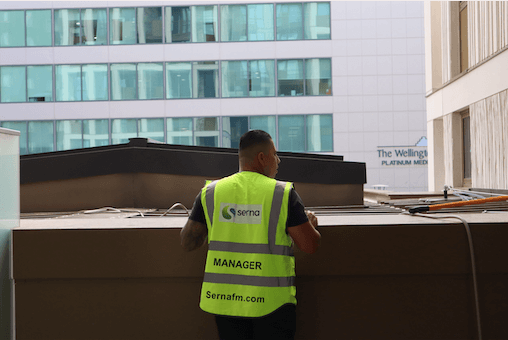Facilities Management (FM) is a crucial aspect of any organisation, ensuring that the physical environment supports the organisation’s primary activities. As businesses grow and evolve, the role of facilities management has become more complex and integral. With this in mind, Serna FM delves into the definition of facilities management, its core functions and its importance in today’s business environment.
What Is The Definition Of Facilities Management?
Facilities Management (FM) can be broadly defined as the discipline that ensures the optimal functioning of built environments by integrating people, places, processes and technology. It encompasses a wide range of activities and responsibilities, from maintaining and managing buildings and infrastructure to ensuring the comfort, safety, and efficiency of the working environment.
What Are The Key Elements Of Facilities Management?
- People: Ensuring the wellbeing, safety, and productivity of the people using the facilities.
- Place: Managing the physical space and infrastructure to create an optimal environment for occupants.
- Process: Implementing efficient processes for maintenance, repairs and operations to ensure smooth functioning.
- Technology: Leveraging technology to enhance the management and monitoring of facilities.

What Are The Core Functions Of Facilities Management?
Facilities Management covers a broad spectrum of services and activities that support the core business functions. Here are some of the primary functions:
- Building Maintenance and Operations
- Preventive Maintenance: Regular inspections and maintenance to prevent breakdowns and prolong the life of assets.
- Repairs: Addressing issues promptly to ensure minimal disruption to operations.
- Energy Management: Implementing strategies to reduce energy consumption and costs while promoting sustainability.
- Space Management
- Space Planning: Efficient use of space to accommodate organisational needs and growth.
- Workplace Design: Creating ergonomic and functional workspaces that enhance productivity and employee satisfaction.
- Relocation Management: Planning and executing the movement of people and equipment within or between facilities.
- Health and Safety
- Compliance: Ensuring facilities comply with health, safety and environmental regulations.
- Risk Management: Identifying and mitigating potential risks to ensure a safe working environment.
- Emergency Preparedness: Developing and implementing emergency response plans.
- Security
- Physical Security: Implementing measures to protect people, assets and information.
- Access Control: Managing and monitoring access to facilities to ensure only authorised individuals can enter.
- Surveillance: Using security systems and monitoring tools to safeguard the premises.
- Custodial Services
- Cleaning: Maintaining a clean and hygienic environment through regular cleaning services.
- Waste Management: Efficient disposal and recycling of waste materials to promote sustainability.
- Vendor Management
- Contract Negotiation: Negotiating contracts with vendors and service providers.
- Performance Monitoring: Ensuring vendors meet agreed-upon service levels and standards.
- Sustainability Initiatives
- Green Building Practices: Implementing eco-friendly practices in building design, construction, and operations.
- Resource Conservation: Promoting the efficient use of resources such as water and energy.
- Sustainability Reporting: Tracking and reporting on sustainability efforts and outcomes.
What Is The Importance Of Facilities Management?
Facilities Management plays a pivotal role in the success of an organisation. Its impact is felt in several areas:
- Operational Efficiency
- Effective FM ensures that facilities and assets are well-maintained, minimising downtime and disruptions. This enhances the overall efficiency and productivity of the organisation.
- Cost Management
- Through preventive maintenance, energy management and efficient space utilisation, FM helps in controlling and reducing operational costs.
- Employee Wellbeing
- A well-maintained and safe working environment contributes to employee satisfaction and well-being. Comfortable and efficient workspaces can boost morale and productivity.
- Compliance and Risk Management
- FM ensures that the organisation complies with all relevant health, safety and environmental regulations, thereby minimising legal risks and potential liabilities.
- Sustainability
- Facilities managers play a crucial role in promoting and implementing sustainability initiatives, helping organisations reduce their environmental footprint and promote social responsibility.

What Is The Evolution Of Facilities Management?
Facilities Management has evolved significantly over the years. Traditionally focused on maintenance and operations, the scope of FM has expanded to include strategic planning and business continuity.
- Integration with Technology
- The advent of smart building technologies and the Internet of Things (IoT) has transformed FM. Facilities managers now use advanced systems for monitoring and managing building operations, improving efficiency and reducing costs.
- Strategic Role
- Modern FM is not just about maintaining buildings but also about aligning the physical environment with the strategic goals of the organisation. This includes space optimisation, workplace strategy and supporting agile working environments.
- Focus on Sustainability
- With increasing awareness of environmental issues, FM has taken on a critical role in sustainability efforts. This includes implementing energy-efficient systems, promoting recycling and achieving green building certifications.
- Emphasis on User Experience
- Facilities Management now prioritises the experience of building occupants. This involves creating comfortable, safe and productive environments that enhance the user experience.
What Are Future Trends For Facilities Management?
The field of Facilities Management continues to evolve, influenced by technological advancements and changing workplace dynamics. Some emerging trends include:
| Smart Buildings | The integration of IoT and smart technologies in buildings will continue to enhance FM capabilities, allowing for real-time monitoring and data-driven decision-making. |
| Sustainability and Green FM | There will be a greater emphasis on sustainability, with facilities managers playing a key role in achieving environmental targets and certifications. |
| Remote Facilities Management | The COVID-19 pandemic has accelerated the adoption of remote work and remote facilities management, where technology enables facilities managers to oversee operations from a distance. |
| Focus on Health and Wellbeing | Post-pandemic, there will be a heightened focus on health and wellbeing, with facilities managers implementing measures to ensure clean, safe, and healthy environments. |
| Integrated Facilities Management (IFM) | The trend towards IFM, where all FM services are integrated and managed by a single provider, is likely to grow. This approach can offer greater efficiency and cost savings. |
Concluding Thoughts
Facilities Management is a vital function that encompasses a wide range of activities aimed at ensuring the optimal functioning of built environments. By integrating people, place, process and technology, FM supports the core activities of organisations, enhancing operational efficiency, reducing costs and improving the wellbeing of occupants. As the field continues to evolve, driven by technological advancements and a greater focus on sustainability and user experience, facilities managers will play an increasingly strategic role in shaping the workplaces of the future.

